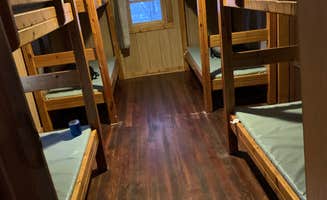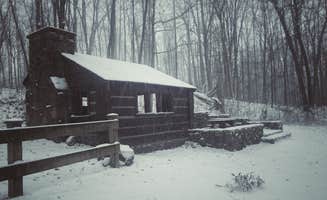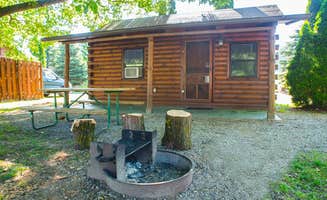Fort Custer Recreation Area and nearby campgrounds offer rustic and modern camping options within a 30-mile radius of Albion, Michigan. The region features lakes, hiking trails, and varied terrain across several state recreation areas with elevations ranging from 900-1,000 feet. Summer temperatures typically reach 75-85°F with moderate humidity, while spring and fall bring cooler weather and fewer insects.
What to do
Mountain biking: 20+ miles of trails at Fort Custer Recreation Area provide options for all skill levels. "We camped and rode at Fort Custer. We've been here 2x before (once in a cabin and once in tents) and this has now officially become a favorite," notes a visitor at Fort Custer Recreation Area.
Paddling: Multiple lakes within Pinckney Recreation Area form a chain allowing for extended water exploration. "The lake is very clean on a small chain," reports one camper. Visitors at Bruin Lake Campground have access to boat rentals at several nearby lakes.
Hiking: Trail system connects campgrounds across Waterloo Recreation Area with routes ranging from 2-35 miles. "There are trail, beaches, boats, horses... so many things to do," shares a Pokagon State Park visitor. The Waterloo-Pinckney Trail offers multi-day backpacking options with designated backcountry camping areas.
What campers like
Secluded sites: Blind Lake offers privacy despite popularity. "Such a cool little backcountry campground. You can hike or paddle in, no car access. The hike can be done a few different ways with the shortest being around 4 miles," explains a visitor to Blind Lake Rustic Campground.
Lake access: Green Lake provides paddling options without motor traffic. "I loved this quiet little campground! I stayed at #6 and had a beautiful view of the lake. There is muddy lake access on that site and I paddled from there in my kayak," notes a camper at Green Lake Rustic Campground.
Star viewing: Limited light pollution at several campgrounds enables night sky observation. "We also were able to see some awesome stars at night," reports a Green Lake camper. Many sites feature open areas that provide unobstructed views of constellations on clear nights.
What you should know
Reservations required at popular campgrounds during peak season. "While you technically don't need a reservation, we made our reservations through the DNR website about a month in advance. The campsite was listed as 'full' when we arrived, so I was glad we took the extra step," advises a Green Lake camper.
Site differences: Privacy varies significantly between campgrounds and individual sites. "We've stayed at both sites listed. 161 you do have neighbors pretty close, but we just stayed at 51 and it is extremely secluded!" shares a visitor at Fort Custer Recreation Area.
Electric-only hookups at many developed campgrounds limit RV amenities. "Sites have electrical service only. Must use the dump station," notes a camper at Fort Custer. Most rustic campgrounds offer no hookups but provide access to water pumps and vault toilets.
Tips for camping with families
Playground access: Multiple recreation areas include developed play areas near beaches. "We spent 4 nights and 5 days camping with my husband and 2 kids. We had fun and the kids had a blast. They rode bikes around the loop and loved swimming and the the playground," shares a visitor at Waterloo Sugarloaf Modern.
Site selection: Reserve early for lake views with easier water access for children. "The campsites were very clean and the put toilets were clean. We really appreciated having a water pump near our campsite," notes a Blind Lake camper.
Insect preparation: Bug populations increase in early summer near lakes and marshy areas. "Lots need mowing so lots of bugs, bring insect repellent," advises a Fort Custer visitor. Long sleeves and pants after dusk help reduce mosquito exposure.
Tips from RVers
Limited full-hookup availability requires planning for water and waste management. "Since there are no water or sewer hook ups, lines at the dump/fill station can get long," cautions a visitor at Pokagon State Park.
Site sizing varies significantly between campgrounds and loops. "Sites are easy to get in and out of with RV/TT," notes a Fort Custer camper. Many rustic campgrounds have limited space for larger rigs while developed campgrounds can accommodate vehicles up to 40 feet.
Seasonal considerations affect access to certain campgrounds. Many rustic campgrounds remain open year-round but with limited services during winter months. "The sites are well spaced and provide privacy if you want it plus room for extra tents or shelters," reports a Pokagon visitor.





